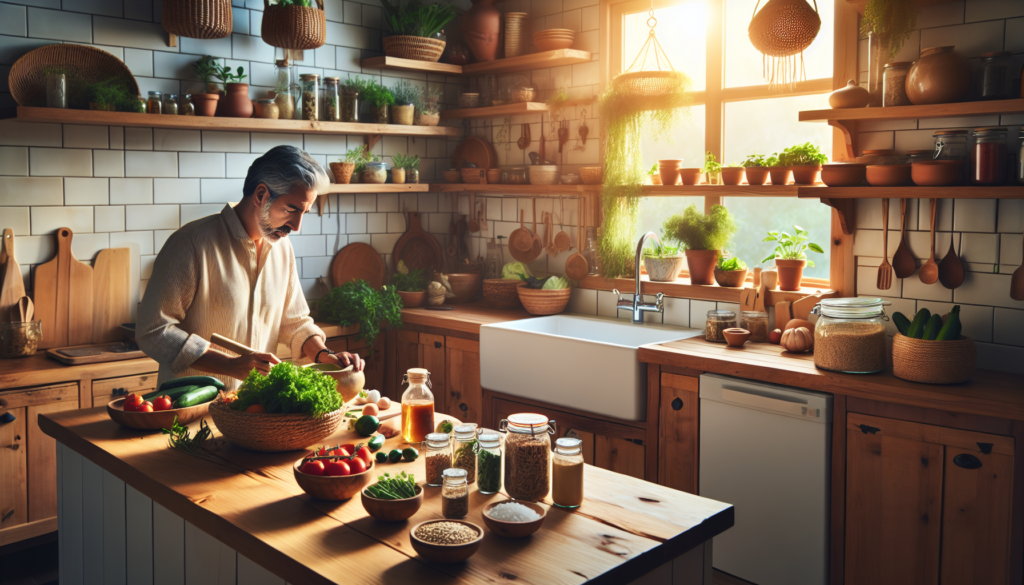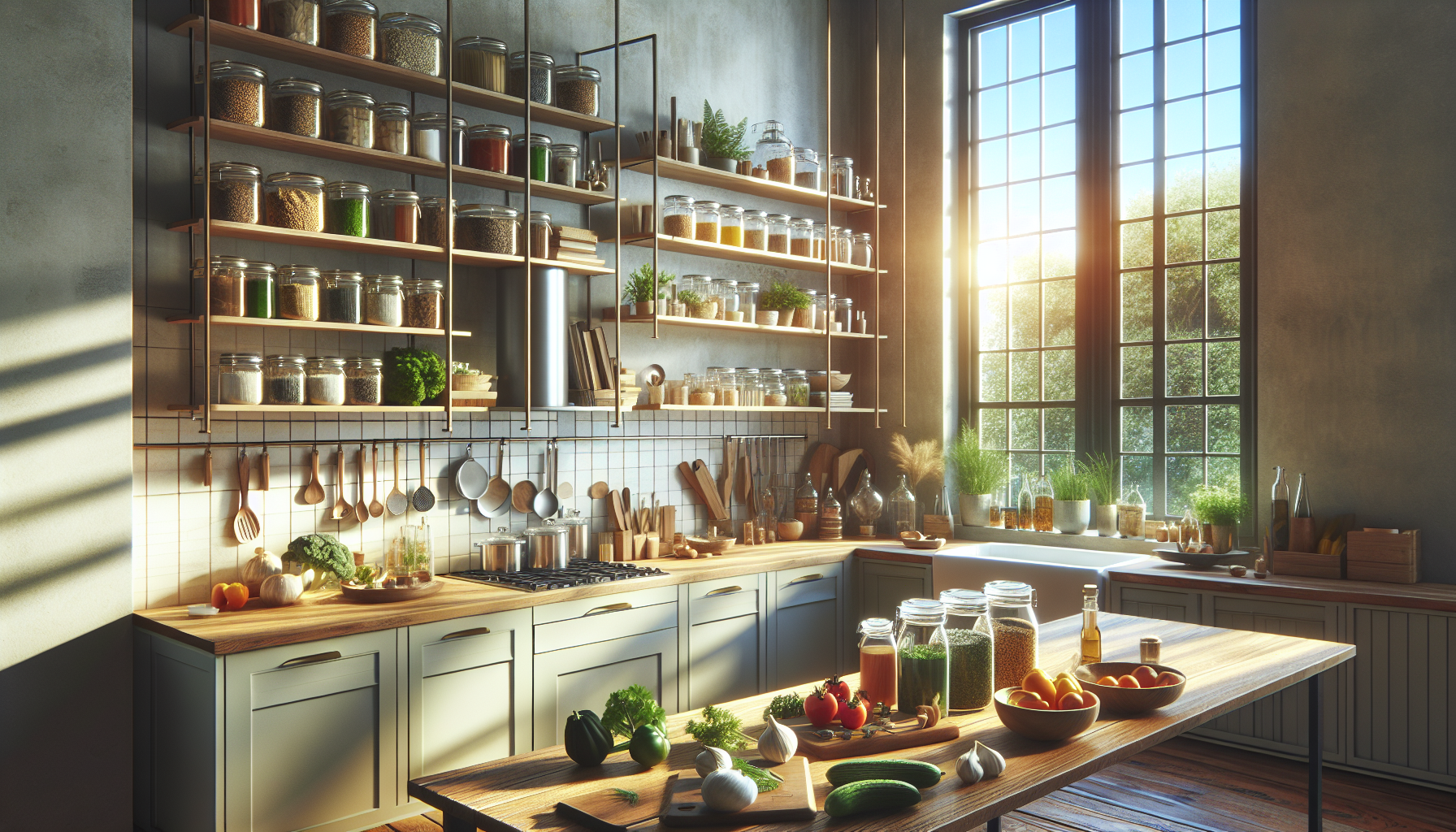Imagine stepping into a kitchen that not only nourishes your body, but also supports your overall well-being. A holistic kitchen is a space where every element harmoniously works together to create a peaceful environment that promotes health and balance. From the ingredients you choose to the organization of your space, there are essential tips that can transform your kitchen into a sanctuary of wellness. In this article, you will discover how to create a holistic kitchen that embraces mindful cooking, sustainable practices, and a connection to nature. Get ready to embark on a journey of transformation, as you learn the essential tips to create a nourishing and holistic kitchen.

Choosing Eco-Friendly Cookware
Cooking can be a joyful and fulfilling activity, and choosing eco-friendly cookware is an important step towards creating a holistic kitchen. When selecting your cookware, opt for non-toxic materials such as stainless steel, cast iron, or ceramic. These materials have natural non-stick properties and are free from harmful chemicals like PFAS. By choosing non-toxic cookware, you can ensure that you and your family are not exposed to any potential health risks.
Investing in sustainable brands is another way to make your kitchen more eco-friendly. Look for brands that prioritize sustainability in their manufacturing processes, such as using recycled materials or implementing green technology. These brands often have a lower carbon footprint and contribute to a more sustainable environment. By supporting these brands, you are not only making a positive impact on the planet but also encouraging other companies to follow suit.
Organizing and Decluttering
An organized kitchen not only looks aesthetically pleasing but also enhances efficiency and productivity. To start organizing and decluttering, evaluate your kitchen items and cleanse your space by getting rid of items that you no longer use or need. This will create more space and make it easier to find what you’re looking for.
Efficient storage solutions are essential for a holistic kitchen. Utilize stackable containers, drawer dividers, and shelf organizers to maximize your storage space. Categorize your items and label them for easy identification. This will not only keep your kitchen tidy but also save you time and energy when cooking.
Embracing Whole Foods
Whole foods are a cornerstone of a holistic kitchen. Prioritize fresh, locally sourced ingredients to support local farmers and reduce the carbon footprint associated with long-distance transportation. By purchasing from local farmers’ markets or joining a community-supported agriculture (CSA) program, you can ensure that you are consuming high-quality ingredients while supporting sustainable farming practices.
Aim to minimize processed foods in your diet. Processed foods often contain additives, preservatives, and excessive amounts of salt and sugar. By reducing your consumption of processed foods, you can maintain a healthier diet and reduce packaging waste. Instead, incorporate whole grains and legumes into your meals. These nutrient-dense foods are not only good for your health but also environmentally friendly due to their minimal processing.
Promoting Waste Reduction
Waste reduction is a crucial aspect of creating a holistic kitchen. Implement recycling and composting systems to minimize waste that goes to landfills. Separate recyclable materials such as plastics, glass, and paper, and compost food scraps and organic waste to create nutrient-rich soil for your garden.
Another way to promote waste reduction is by reducing single-use items. Swap out disposable items like plastic utensils, plates, and cups with reusable alternatives. Invest in durable and eco-friendly options such as bamboo utensils, stainless steel straws, and cloth napkins. By making these small changes, you can significantly reduce your contribution to landfill waste.
Optimizing food storage is another waste reduction strategy. Avoid spoilage by storing food properly. Use airtight containers or beeswax wraps to keep food fresh for longer. Consider using clear storage containers, so you can easily see what’s inside and minimize the risk of forgotten or wasted food.

Maximizing Natural Light and Ventilation
Natural light and ventilation play essential roles in creating a harmonious kitchen environment. Position windows strategically to maximize the natural light that enters your kitchen. This not only creates a welcoming and uplifting ambiance but also reduces the need for artificial lighting during the day, saving energy.
Use light-colored curtains or blinds that allow light to pass through while preserving privacy. This way, you can enjoy the benefits of natural light without compromising on privacy. Additionally, installing a ventilation system helps to remove cooking odors, steam, and pollutants from the air, ensuring a fresh and clean kitchen environment.
Creating a Balanced Kitchen Layout
The layout of your kitchen can greatly impact your cooking experience. Consider ergonomics and workflow when designing or reorganizing your kitchen. Arrange your stove, sink, and refrigerator in a triangular layout, known as the work triangle, to optimize efficiency. This ensures that the three most-used areas of the kitchen are easily accessible and allows for a smooth workflow.
Allocate specific spaces for different kitchen tasks. Create designated areas for meal preparation, cooking, and cleaning. This not only makes your kitchen more organized but also increases productivity. Arrange your tools and ingredients in a way that allows for efficient access. Keep frequently used items within easy reach to avoid unnecessary bending or stretching.
Implementing Sustainable Cleaning Practices
Maintaining a clean kitchen is important for food safety and overall well-being. However, it’s equally important to choose cleaning products that are safe for both you and the environment. Opt for non-toxic cleaning products that are free from harmful chemicals like ammonia or bleach. Look for eco-friendly brands that use natural ingredients and biodegradable packaging.
Homemade cleaners can be a cost-effective and eco-friendly alternative to commercial cleaning products. Ingredients like vinegar, baking soda, and lemon juice can be used to make effective and non-toxic cleaners for various kitchen surfaces. Not only do these homemade cleaners eliminate the need for harsh chemicals, but they also reduce plastic waste from packaging.
Reducing water consumption is another aspect of sustainable cleaning practices. Use a dishwasher instead of hand washing dishes, as it typically uses less water. When hand washing, fill the sink or use a basin to minimize water usage. Install a faucet aerator to reduce water flow while still maintaining adequate pressure. These small changes can add up to significant water savings over time.
Growing Your Own Herbs and Veggies
One of the most rewarding ways to create a holistic kitchen is by growing your own herbs and vegetables. Determine the ideal growing areas in your kitchen, such as a windowsill or a countertop. Choose areas that receive ample sunlight or invest in a grow light to provide plants with the necessary light for healthy growth.
Select suitable containers and soil for your plants. Use pots or planters with drainage holes to prevent waterlogging. Opt for organic potting soil or create your own by mixing compost with regular potting soil. This will ensure that your plants receive the essential nutrients they need to thrive.
Maintain proper lighting and watering for your plants. Ensure that they receive enough sunlight or artificial light for at least 6-8 hours a day. Water your plants regularly, keeping in mind that different plants have different water requirements. By growing your own herbs and veggies, you can enjoy the benefits of fresh, homegrown produce while reducing the carbon footprint associated with transportation.
Incorporating Natural and Organic Food Storage
Preserving the freshness of your food is essential in creating a holistic kitchen. When it comes to food storage, choose BPA-free containers to avoid harmful chemicals leaching into your food. Glass containers are a great choice as they are durable, reusable, and do not absorb odors or flavors.
Utilize glass jars for storing bulk items such as grains, nuts, and spices. They not only keep your pantry organized but also minimize the need for single-use plastic bags or containers. Additionally, consider using beeswax wraps or silicone food covers as an eco-friendly alternative to plastic wrap. These reusable covers are effective at preserving the freshness of your food while reducing plastic waste.
Creating a Mindful Cooking Routine
The kitchen is not just a space for cooking; it can also be a place for mindfulness and self-care. Practice mindfulness in your meal preparation by being fully present in the moment. Engage your senses, appreciate the aroma of spices, and embrace the textures and flavors of the ingredients. By being mindful, you can enhance your culinary skills and create dishes that are not only nourishing but also made with love and intention.
Enjoy the cooking process and embrace it as a form of relaxation and creative expression. Cooking can be therapeutic and a way to relieve stress after a long day. Take the time to experiment with new recipes, try different cooking techniques, and savor the joy of creating delicious meals.
Avoid rushing and multi-tasking while cooking. Instead, focus on one task at a time and enjoy the process. By being present and mindful in the kitchen, you can create a balanced and holistic cooking routine that nourishes both your body and mind.
In conclusion, creating a holistic kitchen involves making conscious choices that benefit both you and the environment. By opting for eco-friendly cookware, organizing and decluttering your space, embracing whole foods, promoting waste reduction, maximizing natural light and ventilation, creating a balanced layout, implementing sustainable cleaning practices, growing your own herbs and veggies, incorporating natural and organic food storage, and embracing a mindful cooking routine, you can transform your kitchen into a space that supports your well-being and the well-being of the planet. Start making small changes today, and watch as your kitchen becomes a holistic haven that enhances your cooking experience and nourishes your body and soul.

